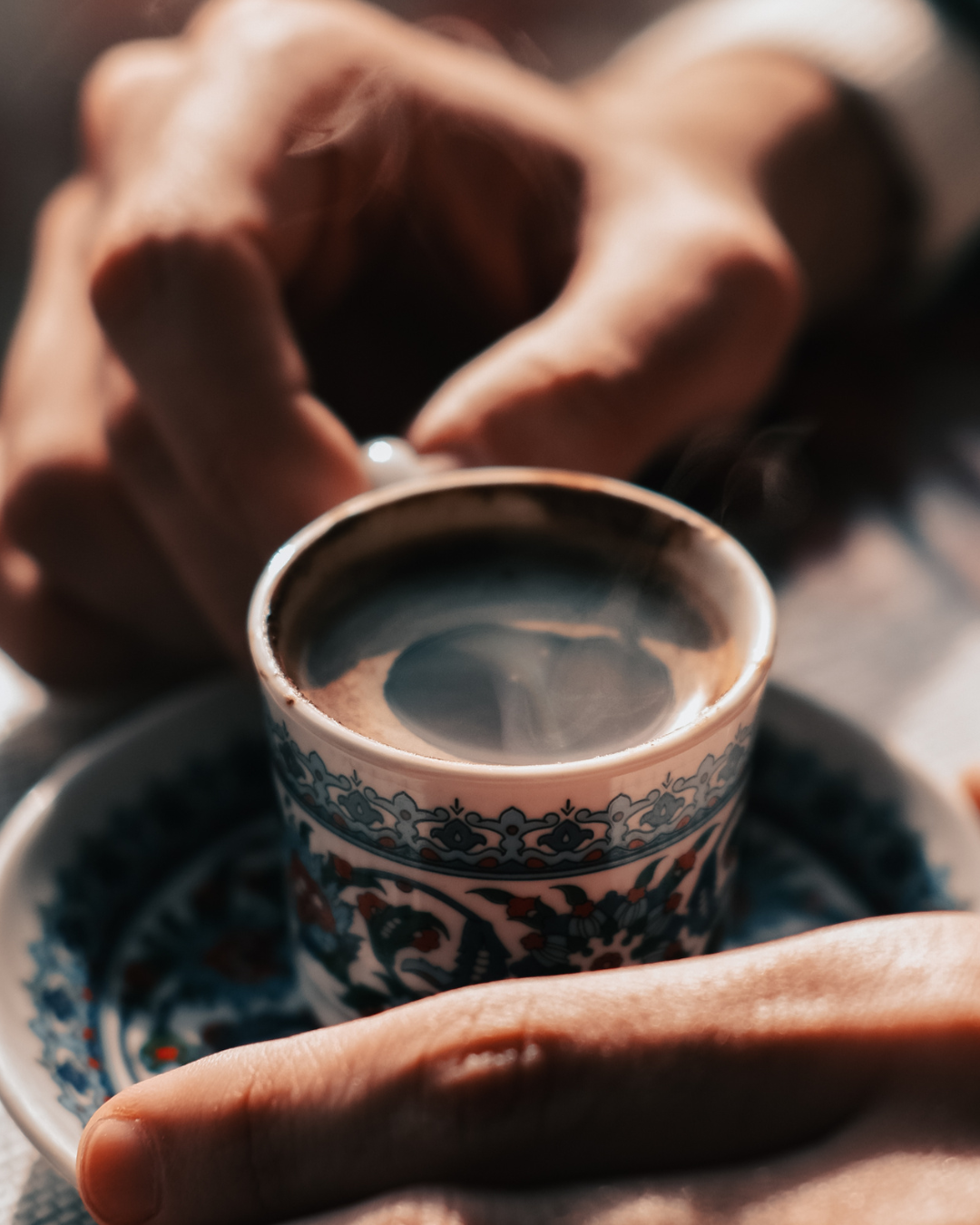F. T Rose
Turkish Fortunes
My grandmother used to preside over spontaneous Turkish coffee cup readings with practiced showmanship and deft fingers. I, on the other hand, never liked drinking the thick sludge to get to the exciting part. Once I tried to expedite the process by sneaking it to the sink and dumping half the liquid out.
“It doesn’t work if you don’t drink it.” She’d admonish me lightly. I swear she had eyes in the back of her head. I would slink back to the parlour table and experiment with the tiniest of sips. The rough dregs never stopped leaving a bitter coating on my tongue, but the older I got the more disinclined I became to mess up the ritual. I believed in my grandmother’s magic.
When each cup was three quarters empty we’d flip them over onto their saucers, set them back on the table, and wait. I remember kicking my legs impatiently against the chair, wondering what images were forming. After what seemed to my seven-year-old brain like forever, she’d call me over.
“Shee-wee*, bda’alak**, come let’s see what’s in your cup.” Then she’d right my cup, peer into it, and begin like she always did.
“Ohhhhhh,” she’d intone. “This is a very good cup. You’ll have a very long life. What an excellent cup. You see this line? It means you’ll travel on a long trip. And over there, do you see the fish? The fish means you’ll have everything you could ever want. And there’s the number six. And those wiggly lines, they’re people. You will speak with many people in the next six days. Yes, this is a very good cup.” One by one, she’d feign excitement, furrow her brow, and interpret the grounds with the drama of a Shakespearean player. My mother and aunts would laugh and seem pleased with the results.
I was in my late twenties before I gathered that our seemingly permanent streak of good luck was more performance than clairvoyance. A mentor had gifted me a deck of tarot cards, and I brought them along to my grandmother’s on my next visit. To my surprise, she was not pleased.
“You shouldn’t play with those. Forget about that stuff.” She was never one to sugar-coat her opinion, but I was genuinely confused. Surely there wasn’t much difference between my cards and her tasseomancy. I pressed for clarification. She gave me a long look.
“Sit down. I’ll tell you a story if you want to know so badly. When I was in high school, in Baghdad, my friend taught me how to read cups. I would practice at parties. I got pretty good at it, or so people told me. But one day…” She bent down mid-sentence to take a tray of date cookies out of the oven. A wave of hot spiced air hit my face.
“But one day what?”
“Here, bda’alak, have one.” She put the hot treat on a napkin and slid it across the counter. One didn’t refuse my grandmother’s baking. I took a bite, nodding for her to continue.
“One day, I was reading for my friend Layla, and I saw in the cup that her relative was going to die. Sure enough, a few months later they fell ill and passed away. Then I predicted another death, of a neighbour this time. I became frightened. I didn’t want anyone else to die. But I could see things, you know?” She filled the kettle with water and put it on the stove, busying her hands while her mind danced backwards in time.
“So I decided—I must have been sixteen at the time—that from then on I would read every cup as a very good cup.” She filled a glass with water and dumped it into the soil around her favourite aloe plant.
“What do you want for lunch? We can make dolma if you like.” She peered into the refrigerator, nonchalant. A full thirty seconds passed before I could answer her, my brain connecting dots faster than I could digest the implications. As far back as I could recollect, my colourful, opinionated, brash grandmother was typecast by family members as a larger-than-life caricature, not to be taken seriously. In retrospect, I wonder if she preferred it that way.
My grandmother was a seer. She knew more than she let on. More importantly, she saw me, and how alike we were. Against the backdrop of tremendous uncertainty that was my childhood, she’d tried her best to protect me from a harsh reality that was out of my control, and not of my making. Though she never did say why she was averse to my learning divination, it hit me plain as day. She knew that I, too, had the ability to see—the complexity of things, the essence of things, the ugly things, the fragile barely breathing things. She was trying to protect me from myself.
*Shee-wee was my grandmother’s nickname for me when I was a child.
**Bda’alak is a shortened form of the Judeo-Arabic endearment Bda’alak Ana, which means “I will take your place if you are to be sacrificed.”
